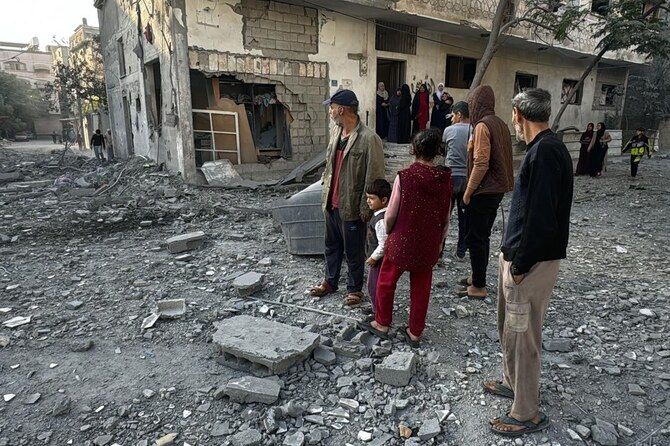Egypt Proposes Two-Day Gaza Truce in Hope of Complete Ceasefire

Egyptian President Abdel Fattah al-Sisi has proposed a two-day truce in Gaza and a limited hostage exchange aimed at securing “a complete ceasefire” after more than a year of war between Israel and Hamas.
The proposal includes exchanging four Israeli hostages held in Gaza for Palestinian prisoners in Israeli jails, with further negotiations to follow within 10 days, Sisi stated at a news conference in Cairo.
He did not clarify whether the plan had been formally presented to either Israel or Hamas.
Sisi’s proposal comes as Israel continues its offensive in the Palestinian territory while simultaneously fighting a war against Hezbollah in Lebanon and having just conducted airstrikes on Iran.
Saturday’s strikes were Israel’s response to previous Iranian ballistic missile attacks, drawing global calls for restraint.
The U.N. Security Council is set to meet on Monday at Iran’s request, with Tehran calling for the body to condemn the strikes that killed four soldiers.
Iranian leaders downplayed the strikes’ significance, saying the attacks caused only limited damage.
President Masoud Pezeshkian told his cabinet that Iran does not seek war but promised “an appropriate response.”
According to Foreign Minister Abbas Araghchi, Tehran had “received indications” hours before the attack. U.S. news site Axios reported earlier that Israel had provided a warning to “prevent a wider escalation.”
With traders relieved that Israel’s strikes had avoided Iran’s energy infrastructure, oil prices tumbled Monday, falling as much as five percent before recovering some of their losses.
Israel launched the strikes in retaliation for an Oct. 1 missile attack by Iran, which itself was a response to the killings of Tehran-aligned militant leaders and an Iranian commander.
Israeli Prime Minister Benjamin Netanyahu said the operation “was precise and powerful, achieving all of its objectives.”
Netanyahu, speaking at a Jerusalem memorial for Hamas’s Oct. 7 attack, was interrupted by victims’ relatives.
The premier has been under pressure to secure the release of captives held in Gaza.
‘Painful concessions’
Egypt, alongside Qatar and the United States, has been mediating indirect talks for months but with little success.
Israeli spy chief David Barnea is due in Qatar on Sunday for talks aimed at restarting negotiations towards a hostage deal.
Families of the hostages are urging the Israeli government to broker an agreement following the killing of Hamas leader Yahya Sinwar earlier this month.
One of the main issues delaying negotiations has been Hamas’s demand for Israel’s complete withdrawal from Gaza, a condition Israeli official have consistently rejected.
Earlier on Sunday, Israeli Defense Minister Yoav Gallant indicated that “painful concessions” might be necessary in negotiations, acknowledging that military action alone would not achieve the country’s war aims.
At least 42,924 Palestinians have been killed in the Israeli offensive on Gaza, the majority of whom are civilians, according to figures from the health ministry in the Hamas-run territory, which the U.N. considers reliable.
The ongoing war has drawn in Iran-backed groups across the region, most notably Hezbollah in Lebanon, but also militias in Iraq, Syria, and Yemen. The interconnected nature of these conflicts raises fears of a broader regional escalation that could further exacerbate the humanitarian crisis in Gaza and neighboring areas.
In light of the continuous violence, humanitarian organizations are calling for immediate access to aid and protection for civilians affected by the conflict. The International Red Cross and other agencies have expressed urgent need for medical supplies, food, and shelter for those displaced by the bombings and ground offensives.
As diplomatic efforts to broker a ceasefire continue, the international community remains vigilant for signs of potential resolutions. However, the escalation of attacks complicates those efforts, with both sides entrenched in their positions and responding to provocations with further military actions.
The situation remains fluid, and developments can change rapidly, emphasizing the need for ongoing monitoring and engagement from global actors to promote peace and stability in the region.




